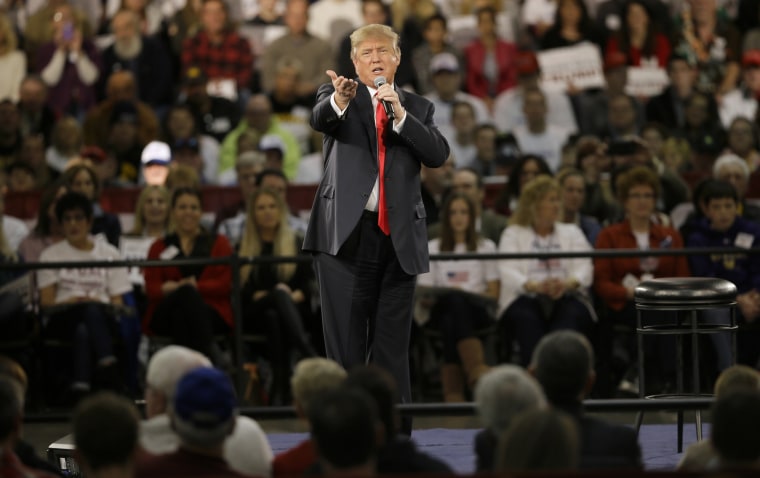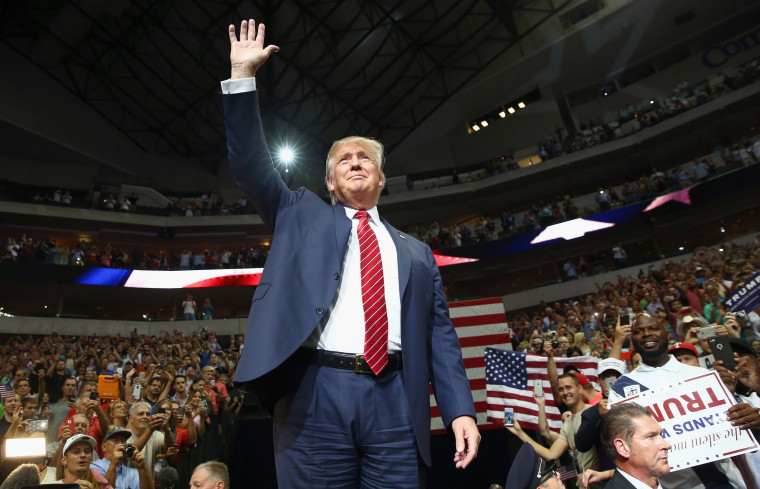The Black vote is not a lock for the Democrats or the Republicans in 2016. NBCBLK is running a series of articles posing custom questions toward each candidate running for office: Martin O'Malley, Jeb Bush Chris Christie, Bernie Sanders, Scott Walker, John Kasich, Carly Fiorina and Ted Cruz for starters.
We don't presume an "African American" political agenda, (something that may or may not exist for that matter). Instead this series looks at policy and home turf issues, and evaluates how those factors would specifically impact African American voters. We look at existing policy, statements and legislation, and ask questions based on what the candidate has already laid out. Hopefully their campaigns will feel compelled to respond.
Imagine if the following candidate was running for president. An incredibly rich old white businessman who’d never held elected office in his life. He had been sued for housing discrimination in the 70s, had a history of racist actions and statements and made a mockery of traditional marriage. However he’d also been given awards for his work in the black community, was a big player on television and helped turned dozens of black men and women into successful millionaires.
Do you think African Americans would vote for him? What if I told you his name was Donald Sterling? You see, everything above is true about both Sterling and Trump except that Donald Trump has NEVER received any sort of NAACP award for supporting the black community and Sterling has probably created more black millionaires by owning the Clippers than Trump ever did on the Apprentice.
The point is, in evaluating Donald Trump, all too often the black community gives him a pass because of his name and his television show, when someone with the exact same resume wouldn’t be given the time of day by voters (let alone a group of pastors).
RELATED: 3 Questions African Americans Should Ask Martin O'Malley
For most of Trump’s public life in the 80s and 90s, he was known more for tabloid magazine fodder about his divorces and creative uses of ‘bankruptcy’ laws than for politics. He hobnobbed with political elites, either Republican or Democrat in New York, something that he now claims is a political strength.
Trump seriously jumped into the political realm after the election of President Obama when he became one of the most well-known “Birthers”, people who claim that Barack Obama isn’t a naturalized citizen and that he was actually born in Kenya.
While not explicitly saying so at the time, Trump was allying himself with some of the more extreme, conservative and often racially hostile elements of the Republican Party. This is particularly important because Trump’s policy positions and supporters are often mistaken for being moderate or independent when they’re actually just extremists.
Trump vows to revoke the Affordable Care Act but says single payer systems work well in other countries. He’s a free market capitalist but would pass more protectionist policies if he’s elected president. While these beliefs might be shared by many voters it is difficult to predict exactly where Donald Trump stands on many issues.
Since announcing that he would seek the Republican nomination earlier this year Donald Trump has rattled off a series of racist, sexist, able-ist and overall offensive statements in various public speeches and interviews. Despite this, Trump has pretty much led the Republican field (even fending off a short surge by Dr. Ben Carson) in national polls and primary state polls for over 3 months.
African American voters looking at the entire field of candidates have a great deal to consider when deciding whether or not to support Donald Trump. Here are three questions we think should be the first to consider posing to him and his campaign.

1. What is the complete Immigration Policy of Donald Trump?
Donald Trump has gained most of his traction early in the campaign for his aggressive and possibly unconstitutional positions on immigration.
Donald Trump has consistently said that many illegal immigrants from Mexico are rapists, felons and bring diseases to the United States in addition to taking jobs from American citizens. In one of his more aggressive claims, Donald Trump proposes building a wall to keep out Mexican illegal immigrants and forcing the Mexican government to pay for it. In his immigration proposal released to the public in August Trump advocated ending “Birthright Citizenship” meaning that children born in the United States would no longer actually be citizens if one or both of their parents were in the country illegally.
In the aftermath of the Paris Terror attacks Trump has gone further stating that the United States should monitor and limit the number of Muslim refugees coming in the country and keep tabs on mosques.
One of the biggest challenges facing legal African and Caribbean immigrants is the ‘prison to deportation’ pipeline
As legally questionable as these policy suggestions may be, they actually don’t address one of the main issues facing black immigrants, legal and otherwise in the United States. One of the biggest challenges facing legal African and Caribbean immigrants is the ‘prison to deportation’ pipeline that is strongly related to aggressive policing and arrests.
African and Caribbean immigrants are often profiled like African Americans by police, but in their cases arrests for petty offenses like having unpaid parking tickets or back child support can result in an arrest and deportation under the Illegal Immigration Reform and Immigrant Responsibility Act.
These deportations are incredibly disruptive to black families, destabilize local economies and cost families thousands of dollars in legal fees and fines. The Congressional Black Caucus has fought to scale back the number of crimes that immigrants can be deported or confined for but so far haven’t made much progress. African Americans should ask Donald Trump what his full immigration policy would look like, especially in regards to immigrants who are here legally in the United States.

2. How will your racist statements affect the policies that you enact as President?
Donald Trump has a long and well documented history of racist statements, supporting racist policies and being directly hostile to those who work with or speak on behalf of the African American community.
Dating back to the 1970’s Trump was sued by the Federal Government for engaging in housing discrimination against African Americans in New York, in the 80s he took out a full page ad in the New York Times calling for the death penalty to five black boys accused of a brutal rape in central park. Even once they were exonerated 12 years later he maintains his stance and the deeply racial overtones associated with it.
Former African American employees of his casinos report specific and widespread discrimination from Trump himself along with a generally racially hostile work environment. Even on his reality show "The Apprentice", Trump’s actions towards African American contestants (his 2005 antics with winner Randall Pinkett being the most egregious) have dripped of micro-aggressions and questionable behavior.
If he does not support policies that ensure fair employment and hiring practices, even his most modest proposals provide no benefit to black voters.
During the course of his campaign he’s openly accepted the support of Klan members and other white supremacists in the audience. He’s tweeted out racist and false information about African American crime statistics and has made repeated racist statements about President Obama.
And while Donald Trump certainly has the endorsement of some African Americans, mostly notably former Apprentice star Omarosa and some (but apparently not all) of a group of black pastors he has courted in his New York office, he is generally universally disparaged by African Americans on the right and the left.
His proposals to get the economy going by bringing in more jobs, and scaling back government regulations may actually help black voters but at the same time, if he does not support policies that ensure fair employment and hiring practices, even his most modest proposals provide no benefit to black voters.
The question that African American voters should ask Donald Trump is whether the clearly racist statements he’s made will be mitigated by policies that would actually help the black community.

3. What is the Domestic Policy of Donald Trump ?
Donald Trump’s campaign slogan is “Make America Great Again” and he proposes doing so by bringing back good paying jobs and national security to the United States. However Trump’s overall domestic policy lacks specifics and thus it’s difficult for voters, specifically African American voters to determine what his policies will actually do for them.
While there are collections of Trump’s positions on many domestic issues from education to healthcare to civil liberties, most of those amount to statements that Donald Trump has made. When it comes to actual domestic policy his website is actually sparse.
He has spoken extensively about young black male unemployment but it's unclear whether he ever attempted to bring jobs or opportunities to any impoverished black communities.
He is a strong advocate of improving care for veterans, which would have a huge impact on African Americans who make up a large percentage of homeless and unemployed veterans. He supports gun control like “Project Exile” that supposedly cut crime in half in poor black neighborhoods in Richmond.
He has spoken extensively about young black male unemployment but it's unclear whether he ever attempted to bring jobs or opportunities to any impoverished black communities. His position on other issues like student loan forgiveness, environmental justice, and civil rights are much harder to determine.
Any African American considering a vote for Trump should ask that he flesh out his entire domestic policy, especially in light of his attitudes toward the black community, before giving Donald Trump their vote.
